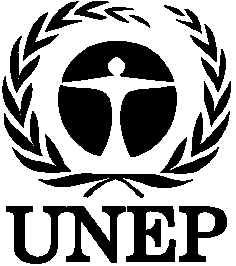|
UNITED NATIONS
ENVIRONMENT PROGRAMME |
|
For use as information
Not an official record
NEWS RELEASE
PROGRESS MADE IN NEGOTIATING GLOBAL TREATY
ON PERSISTENT ORGANIC POLLUTANTS; 121 COUNTRIES
PARTICIPATE
NAIROBI/GENEVA,
27 March 2000 - The fourth round of negotiations on a global treaty on persistent organic
pollutants (POPs) concluded on 25 March 2000, with governments reaffirming eventual
elimination as the goal of the Convention and including exemptions for use of DDT in
controlling malaria mosquitoes and for existing uses of polychlorinated biphenyls (PCBs),
subject to periodic review. Intensive
discussions also laid the basis for deciding on technical and financial assistance at the
last round of negotiations, to be held from 4-9 December, 2000 in Johannesburg, South
Africa.
“Negotiators
made important progress on a number of key issues. They are now in a good position to
reach agreement on the treaty by the end of 2000, the deadline in the mandate from the
Governing Council of the United Nations Environment Programme,” said Klaus Toepfer,
UNEP Executive Director. “Because
persistent organic pollutants endanger human health and the environment from one
generation to the next, countries are doing the hard work needed to write a treaty that
can withstand the test of time.”
A
total of 317 delegates from 121 countries participated in the Intergovernmental
Negotiating Committee (INC) negotiation, working with 11 UN bodies and specialized
agencies, 7 intergovernmental organizations, and 81 non-governmental organizations and
other bodies. Meeting participants totalled
501. Delegates will now consult with their
governments on proposals made and issues identified in Bonn, including technical and
financial assistance.
“The
meeting recognized that technology and funding are critical to successful implementation
of the Convention. They recognized also that
developing countries and countries with economies in transition will need funds and
environmentally sound technology to allow them to meet the obligations,” Mr. Toepfer
said. “In Bonn, delegates made gains in addressing the ‘what’ and
‘how’ of technology issues. In
South Africa, they can take up proposals for accessing and making better use of technology
assistance.”
New
proposals for ensuring access to funding were considered, including several, which if
adopted, would build on the Global Environment Facility, in recognition of its potential
for addressing global environmental issues. The G-77 countries and China said the nature
of the POPs issue and experience with existing mechanisms reflect the need for a dedicated
financial mechanism, which should include an independent multilateral fund. The meeting
accepted the offer by John Buccini, INC chair, that a meeting of 20 countries be held
intersessionally to seek common ground and help bring about resolution in December.
On
controls, the negotiators favoured retaining the goal of ultimate elimination of
production and use of all 10 intentionally produced persistent organic pollutants in the
mandate. These are the pesticides - aldrin,
chlordane, DDT, dieldrin, endrin, heptachlor, mirex, and toxaphene; and the industrial
chemicals - PCBs and hexachlorobenzene, which is also a pesticide. Such exemptions would be subject to periodic
review to determine continued need.
On
DDT, negotiators continued to favour proposals eliminating production and use, but
including a public health exemption as countries adopt alternative chemical and
non-chemical strategies and reduce reliance on DDT.
Negotiators
agreed generally on basic provisions for continuing minimization of the unwanted
by-products - dioxins and furans. An annex
was proposed as a basis for further negotiations, including not only dioxins and furans,
but also hexachlorobenzene and PCBs when unintentionally formed in certain processes.
Aside
from a few technical issues, agreement was reached on proposals to establish scientific
criteria for identifying additional persistent organic pollutants for future international
action and a procedure for deciding on their inclusion.
The mandate calls for criteria and a procedure to give countries the means to
respond to problems in the future.
Among other provisions, there was support for proposals to: eliminate existing uses of PCBs by certain dates, to be determined; ensure the environmentally sound management of POPs wastes, require national implementation plans, promote information exchange, facilitate technology transfer, and foster research and development.
At the close, the meeting requested the Chair to tidy up the negotiating text and ensure consistency of terminology used to facilitate talks at INC-5.
* * * * *
* * * * * * * * * * * * * * * * * * * * * * * * * * * * * * * * * * * * * * * * * * * * *
* * * * *
The Bonn meeting, held from 20-25 March 2000, is the Fourth Session of the Intergovernmental Negotiating Committee (INC-4) for an International Legally Binding Instrument for Implementing International Action on Certain Persistent Organic Pollutants. It built on the foundation for a treaty laid at the First Session (INC-1) in Montreal; the Second Session (INC-2) in Nairobi; and the Third Session (INC-3) in Geneva.
Note to journalists: Additional information is available via the Internet [www.chem.unep.ch/pops]. For more information or to arrange interviews, please contact James B. Willis, Director, UNEP Chemicals, at tel. (+41 22) 917 81 83; fax (+41 22) 797 34 60; e-mail: chemicals@unep.ch; or Linda Durkee, Policy and Communications Advisor, UNEP Chemicals, at tel: (+41 22) 917 85 11; fax: (+41 22) 797 34 60; e-mail: ldurkee@unep.ch; Tore J. Brevik, UNEP Spokesman/Director of Communications and Public Information, P.O. Box 30552, Nairobi, Kenya; tel and fax: (254-2) 623292; e-mail: cpiinfo@unep.org
UNEP News Release NR00/ 36

